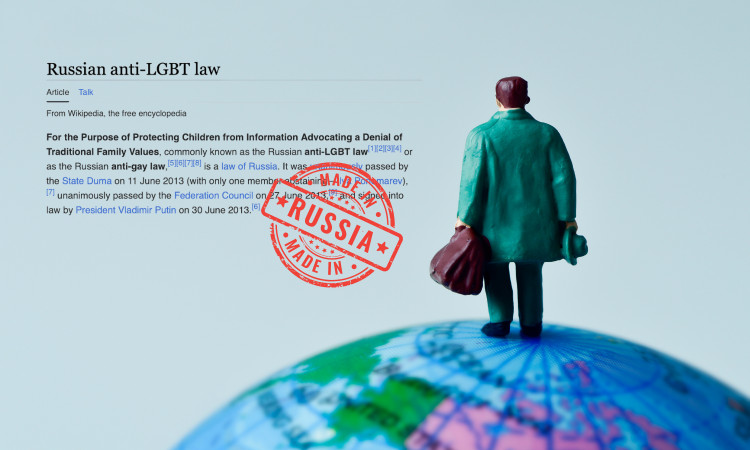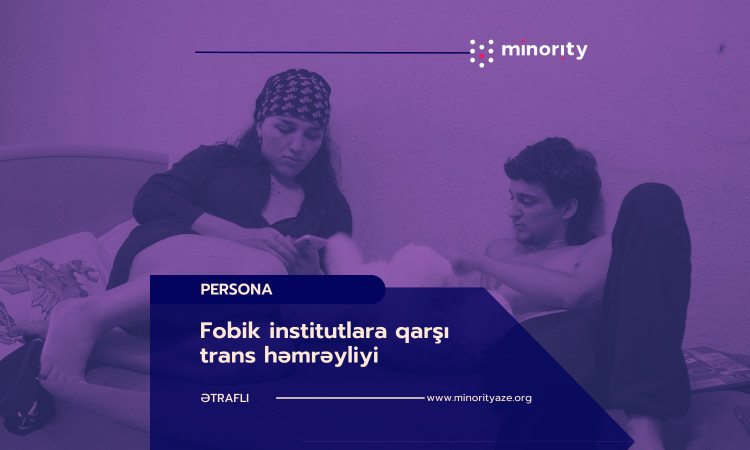Challenges of Queer Women in Workplace
Shattering the Glass Ceiling: Challenges of Queer Women in Workplace
31/May/24
4460
Shattering the Glass Ceiling: Challenges of Queer Women in Workplace
Author: Nilufar Efendiyeva
The challenges queer women face in the field of labour rights are often overlooked, yet studying their experiences is critical to understanding the broader picture of inequality and discrimination in the workplace. In Azerbaijan, the rights of queer people are violated both in workplaces and in other areas of social life. Consequently, in the 2023 annual report published by ILGA-Europe on the protection of LGBTQ+ rights in Europe, Azerbaijan ranked last amongst 49 countries.
It's worth noting that government agencies in the country do not publicly share statistical information about inequality and discrimination in the workplace. This article explores the experiences of queer people in various professional fields, incorporating the perspective of lawyers and activists.
How are queer women discriminated against?
Hayat Alisoy, a trans woman engaged in sex work, argues that due to the illegality of sex work in the country, trans folks lack rights and privileges. She emphasises the absence of employment opportunities for trans women and the lack of interest in addressing this issue. Consequently, many trans women are compelled to engage in sex work. When encountering issues with clients, they refrain from seeking assistance from the law enforcement agencies. Alisoy mentions her own experience of reporting problems with clients to the police, only to have her complaint disregarded. She was advised to remain calm and not pay attention when confronted with such situations.
Discussing the dangerous nature of her work, she shares, 'Of course, I've had many bad experiences. I feel that most of the clients are using drugs; some even arrived with electronic handcuffs on their legs. I told them to leave, but they refused, leading to arguments.' Hayat further explains that she applied to the State Employment Agency in search of alternative employment opportunities. Despite holding a diploma, she received no assistance.
Another interviewee, Shams (name withheld), is a lesbian woman with work experience in various fields. She observes that not only queer women but also cisgender heterosexual women are underrepresented in leadership positions.
"In my workplace, there were 4-5 managers superior to me, but only one of them was a woman," she remarked.
Shams explains that the necessity to conceal one's identity may vary from person to person. In her case, it is not associated with a lack of support or isolation; she simply prefers to avoid additional 'headaches'.
“Generally, revealing one's sexual orientation to a person in an executive position can significantly impact how they are treated in the workplace. I doubt anyone would willingly risk being ridiculed at work due to their personal life for every minor mistake. In more conservative work environments, queer women often encounter discrimination, harassment, violence, and even verbal abuse. In such settings, job security seems elusive.” Shams emphasises that legal loopholes prevent queer women from effectively addressing workplace harassment. Consequently, due to these legal gaps, she prefesr to conceal her orientation as much as possible. As a result, this situation leads her to be more asocial than she is in everyday life.
Leyla (name withheld), a lesbian employee in the service sector, shares that she faced numerous personal questions from coworkers upon learning about her sexual orientation. As a result, she prefers to conceal her orientation as much as possible to avoid judgement.
"I don't think there is any legal framework that acknowledges the existence of queers in Azerbaijan. The law does not tend to protect them. While it can be argued that the rights of LGBTQ+ citizens are covered under human rights, I don't believe that authorities regard queer people on the same level as cisgender heterosexual people who adhere to heteronormative standards. Therefore, queer women continue to be compelled to conceal their identities, as has been the case for centuries, and this situation significantly affects their ability to express themselves," Leyla adds. Additionally, she mentioned that she knows what legal steps to take if discriminated against at work, but she doesn't believe they would be effective.
"Queer women do not have guaranteed access to the labour market."
Labour rights activist Narmin Rustamli, in describing the current situation regarding the protection of labour rights for queer women in Azerbaijan, highlights the main challenge they face: limited access to the labour market. As a result, women who openly express their queerness encounter obstacles, particularly when applying for positions in government institutions. Even after being hired, they often face pressure from both management and colleagues in the workplace. Moreover, LGBTQ+ employees are typically overlooked for executive roles due to a lack of consideration for their qualifications and a perceived inability to handle senior positions seriously.
Narmin Rustamli adds that employers have a responsibility to prevent harassment and discrimination in the workplace:
"Unfortunately, employers often contribute to these situations, further complicating the ability of queer workers experiencing injustice to work in a safe environment. To prevent this, employers and management should not ignore issues such as harassment and bullying; instead, they should openly address them. This can be achieved through collaboration with human resources specialists, organising training sessions and informational sessions in workplaces, and raising awareness about the issue," Rustamli emphasised.
"Queers have the option to apply to the court to address the discrimination they face."
Lawyer Emin Abbasov, in assessing the effectiveness of existing legal mechanisms in Azerbaijan, points out that the fundamental law of the Republic of Azerbaijan—the Constitution—guarantees the rights and freedoms of individuals regardless of their sex. This non-discrimination provision extends to labour relations as all aspects of human rights. However, specific prohibition of discrimination based on gender identity and sexual orientation is not clearly articulated in Azerbaijan's national legislation. Nonetheless, several international human rights treaties ratified by Azerbaijan, which hold the status of national legislation, prohibit discrimination based on gender identity and sexual orientation.
Article 12 of the Constitution mandates that human and civil rights and freedoms be applied in accordance with international agreements to which Azerbaijan is a party, considering these agreements as integral parts of the national legislative system. Furthermore, Article 2.0.5 of the Law of the Republic of Azerbaijan on the Provision of Gender (Men and Women) Equality is the sole legislation that recognises humiliation and insults directed at an individual in labour or service relationships, stemming from their gender or sexual orientation, as well as physical actions (such as touching or slapping) and indecent behavior manifested through obscene words, gestures, threats, defamatory offers, or invitations towards personnel, defining them as sexual harassment and prohibiting them under this law (Article 4).
Additionally, according to the provisions of Article 7 of the law, employers are obligated to ensure gender equality in labour and to take necessary measures to prevent sexual harassment and discrimination based on gender.
The obligation of the employer is defined in paragraph g) of Article 12 of the Labor Code. According to the requirement of that article, necessary measures must be taken to ensure equal working conditions for employees engaged in the same work regardless of their sex, avoid applying different disciplinary measures to employees for the same violation, and prevent discrimination based on gender and sexual harassment.
The lawyer emphasises that queer citizens, like all citizens, have the right to file lawsuits and receive legal representation in cases of labour rights violations and for the protection of labour rights.
When discussing the legal procedures available to queer employees who encounter discrimination at work, Abbasov advises that when queer citizens face discrimination based on their sexual orientation and gender identity, they should seek assistance from professional discrimination lawyers and attorneys to address the discrimination they have experienced. They can then file lawsuits in court to restore their violated rights and seek compensation for the harm they have endured. The protection of all rights of queer citizens in labour relations is ensured by domestic legislation, as well as international human rights documents.
"In my opinion, the primary duty of the Azerbaijani state to ensure the rights of queer citizens in all fields, including the labour process, is to recognise the prohibition of discrimination based on gender identity and sexual orientation in all legislative domains (criminal, administrative, civil, labour, social, etc.), and acknowledge the existence of discrimination based on gender identity and sexual orientation. Subsequently, the second crucial step would be for the effective implementation of the legislation adopted as a requirement of international conventions, to establish and ensure the sustainability of human rights defenders and queer communities, as well as public associations, engaged in safeguarding civil rights and interests in this domain, and to eliminate all existing barriers challenging them," the lawyer added.
According to the 2023 report of a local queer organisation for the UN Human Rights Council's Universal Periodic Review, 60% of LGBTQ+s surveyed (27 respondents) said they have experienced discrimination either looking for work or in the workplace. 11 of the respondents who took part in the survey were women.
Finally, based on interviews with queers and professionals working with them, as well as the findings of the mentioned reports, it can be concluded that the practical implementation of domestic legislation and workplace regulations falls short in addressing the discrimination and unemployment challenges faced by queer women in their professional lives. Despite knowing the legal steps to take in such situations, interviewees express scepticism about their effectiveness due to a lack of trust in the local courts.
Powered by Froala Editor



